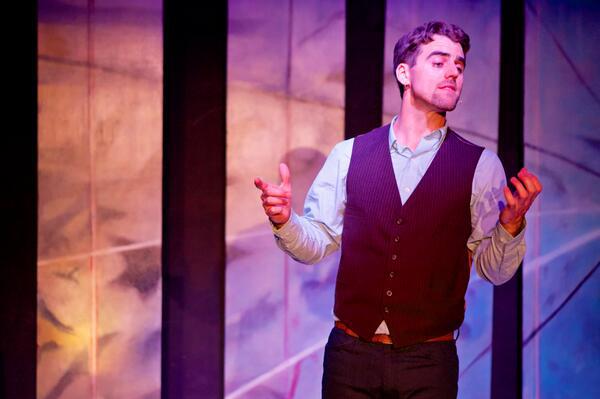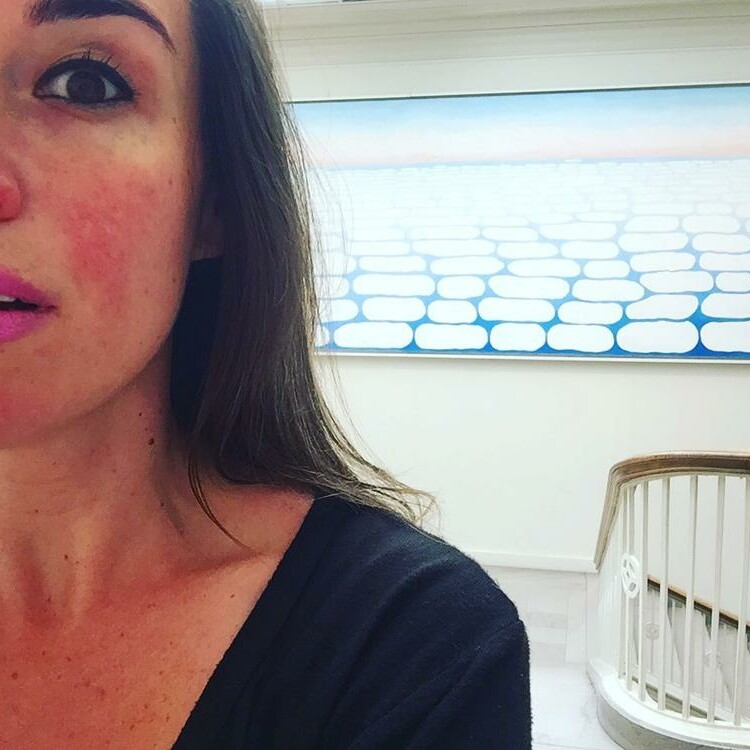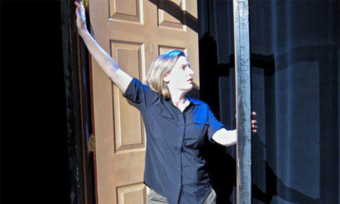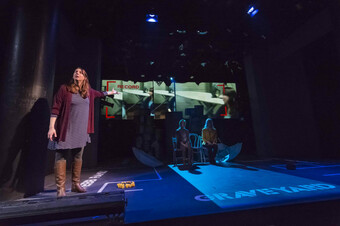Amnesia
A Jewish Perspective on Anti-Latino Prejudice
When Ariel Luckey was growing up, his parents didn’t want to force religion on him, so they let him decide whether he wanted to have a bar mitzvah or not. He explained in his solo show Amnesia that as a twelve year-old he couldn’t imagine a world in which he would choose to spend many hours learning pronunciations of words he didn’t understand. But as he got older and witnessed his cousins’ bar mitzvahs, he began to have doubts. He tells the audience, “I feel like a perpetual visitor every time I’m in a synagogue.” The notion of cultural “belonging” is a fraught one. Even if one “technically” belongs to a culture (Luckey is Jewish by genealogy), if he doesn’t self-appropriate (for instance, speak the language) how far is he removed?
Amnesia is a theatrical piece written and performed by Ariel Luckey. It was commissioned by La Peña Cultural Center in Berkeley, California. The show will open at La Peña on May 15, but I attended a free workshop performance at the Phoenix Center for the Arts in January. The play follows Luckey on a heritage treasure hunt incited by a visit from his great-great-grandfather’s ghost. His great-great-grandfather appears and chides Luckey for not knowing his ancestors’ names or where they came from. Thus begins Luckey’s journey beginning with internet searches and culminating in a trip to the Russian village his great-great grandfather (named Himann, he learns) emigrated from.

and Ethnicity. Source: Twitter
Through stylized jumping and hiding movements in almost slow motion, Luckey depicted the Russian police raids that Himann escaped. When Luckey arrived in Russia, he found out the town his relatives were from had expunged so many Jews during WWII that virtually none remain in the area. Through more research Luckey discovered 34 of his family members had been killed—22 of whom were children. After mourning his family’s losses, Luckey heads back to Phoenix—where the ghost of Himann first sparked his journey.
The play suddenly takes a sharp shift as Luckey introduces the subject of the prejudice Latinos in Arizona (and the United States as a whole) have had to endure. He repeats the stylized jumping and hiding from the account of Himann’s escape in Russia to refer to recent Immigration and Customs Enforcement raids. “It’s happening again,” Luckey solemnly states.
Once the connection to the persecution Jews faced and the persecution Latinos are currently facing has been drawn, Luckey unites the audience in two activities of remembrance. He reads a list of Latino lives lost on the Mexico/Arizona border, and then he asks the entire audience to stand as he recites a holy Hebrew prayer for the dead.
Amnesia is can be described with the phrase “multi” several times over. It is a multi-artistic genre. Luckey wrote and delivered monologues, but he also sang, beat-boxed, break-danced, employed movement, recited poetry, and recorded music on a loop machine. The music is multi-faceted. There was mariachi pre-show music, but parts of the work were underscored by a klezmer. In the full production, there will be a five-piece band. The music “mash-up” seemed highly intentional. In one of the first scenes of the play we learn when Luckey was younger he would mentally add hip-hop beats to the music he heard in synagogue. Finally, the play is multi-cultural in theme: the audience must consider Jewish culture, Hispanic culture, and American culture all the while listening to Luckey’s Oakland vernacular of “hella” and “trippin’.”
One could ask many questions of the “validity” of this piece—especially in light of the recent HowlRound series curated by Rebecca Stevens about cultural appropriation via theater. Is the broad comparison between two persecuted cultures “fair”? Even if it might be valid, is it when it comes from the mouth of someone who is a member of only one of the cultures? Is this artist “qualified” to represent or speak on behalf of another community?
Indeed, in the talkback following the play, someone asked a pertinent question: “Have you ever gotten into any trouble telling this story because you’re white?” The conversation opened several different conversational roads. A Mexican woman offered that she was moved when the named casualties of border wars were read in Spanish. The color of the person reading the names didn’t matter. Someone else shared an anecdote about an illegal immigrant high school friend who never connected more with literature in English class than when he read Anne Frank.
Amnesia is not an attempt to tell someone else’s story; it is an attempt to comment on another culture from his own cultural perspective.
After Luckey had read the list of border causalities he asked the audience to share any names of people we knew who had been lost to immigration politics. Everyone was silent. Perhaps most people in attendance didn’t personally know any illegal immigrants who have passed. But the pause in which we waited for anyone to say a name was heavy. I wondered if the tension arose from the group not knowing whose “right” it was to speak. In talkback Luckey addressed the “who can tell what story” question by conceding maybe anti-Latino prejudice isn’t “his” story to tell. But he added that his story, “changed the way I orient myself to immigration.” Amnesia is not an attempt to tell someone else’s story; it is an attempt to comment on another culture from his own cultural perspective.
Someone commented that while Luckey might be considered “white” now, his ancestors didn’t used to be. I thought about how I, as a third-generation Irish woman, also wouldn’t necessarily have been considered “white” a mere century ago. In essence, if we live in the United States, we or someone in our bloodline, was or would have been othered. We cannot forget our past as Luckey emphasizes in his performance. His piece ends with the line, “I may suffer the long journey to justice. I will not suffer amnesia.”
In talkback, Luckey expressed his passion for speaking about justice beyond his own culture. He recognizes, “my own privilege protects me.” Maybe a white person can never truly understand the full scope of Latino oppression in today’s society, but Luckey argued, “I don’t want to be so scared that I say the wrong thing that I silence my voice.” He added, “Part of what this country needs is white people speaking the fuck up.”
One woman commented on the lack of female perspective within the story. Himann had a wife, as does Luckey, but they were not present in the play. Luckey explained the story is about a man and his great-great-grandfather. Thus, nothing against women, those two men are going to be the key players. The group discussed the lack of female voice in a piece that explored themes of making voices heard. I think it is really interesting that we question Luckey’s “right” or “ability” to represent another voice besides his own in one instance while simultaneously criticizing his lack of inclusion of a different type of othered voice. Meanwhile, a Jewish friend of mine in attendance commented that she felt offended when Luckey openly shared such a sacred prayer that belonged to her culture with others. I hadn’t even considered that angle! A Jewish person could be offended for Luckey sharing his Jewish culture! Basically, everyone can be offended for any reason. Those feelings might be valid, but if we consider all of them, no theater could ever be made. Is that too big a leap to make? That statement probably offended someone reading this.
Luckey’s performance was in workshop. Half was memorized, and half was read at a music stand. He is still revising the work and taking in what community members share with him in these public performances. In response to everything shared in talkback, he ended up saying, “I hope this piece is one voice in a conversation.” I think that is the best tack to take. No piece of art can represent everything, nor can it only represent what people deem “appropriate.” Not that criticism is inherently bad, but perhaps we should also consider what other voices might add to the conversation before worrying if what one voice said was enough or too much.








Comments
The article is just the start of the conversation—we want to know what you think about this subject, too! HowlRound is a space for knowledge-sharing, and we welcome spirited, thoughtful, and on-topic dialogue. Find our full comments policy here
Is a Judaism a religion or a culture? If it's a culture, is Christianity a culture too?
Both are both!